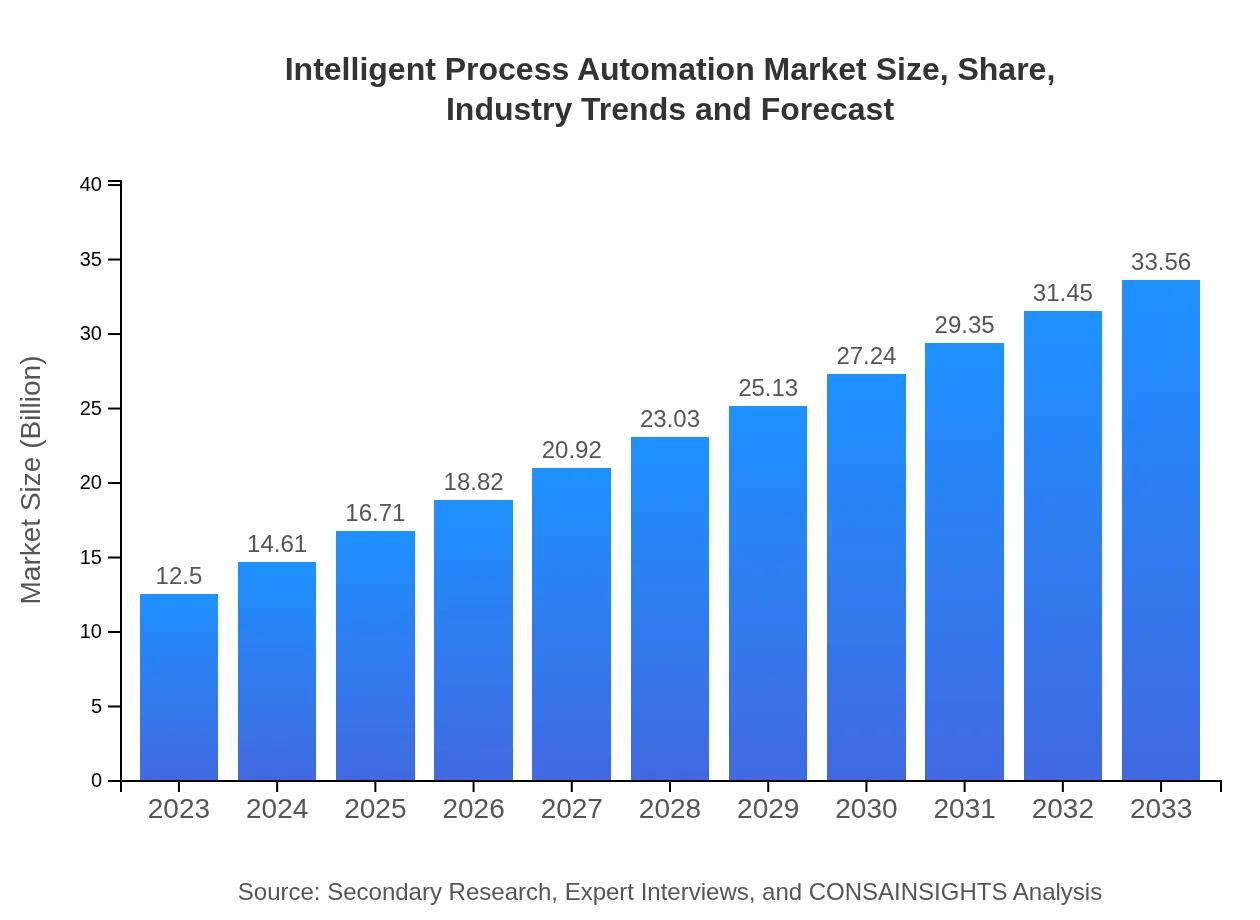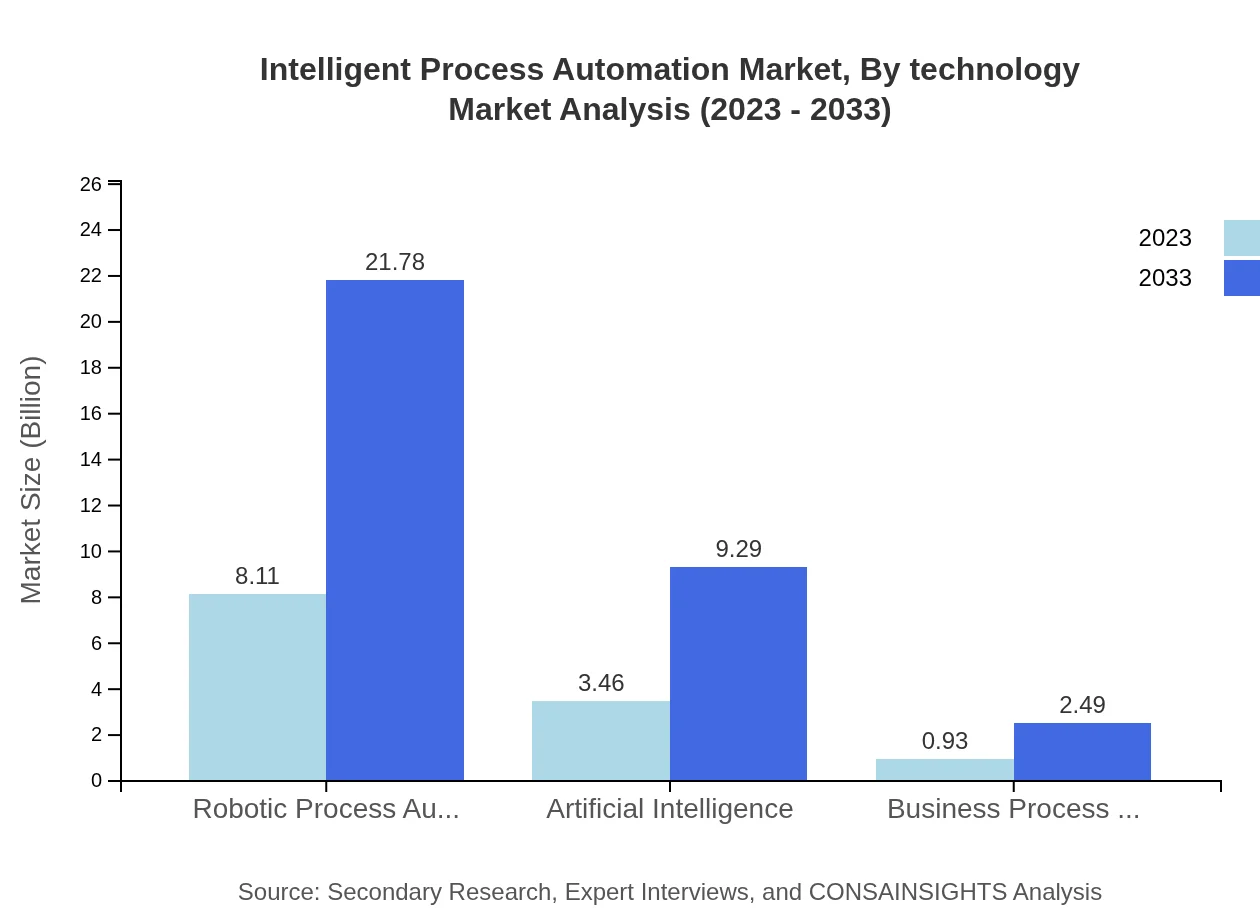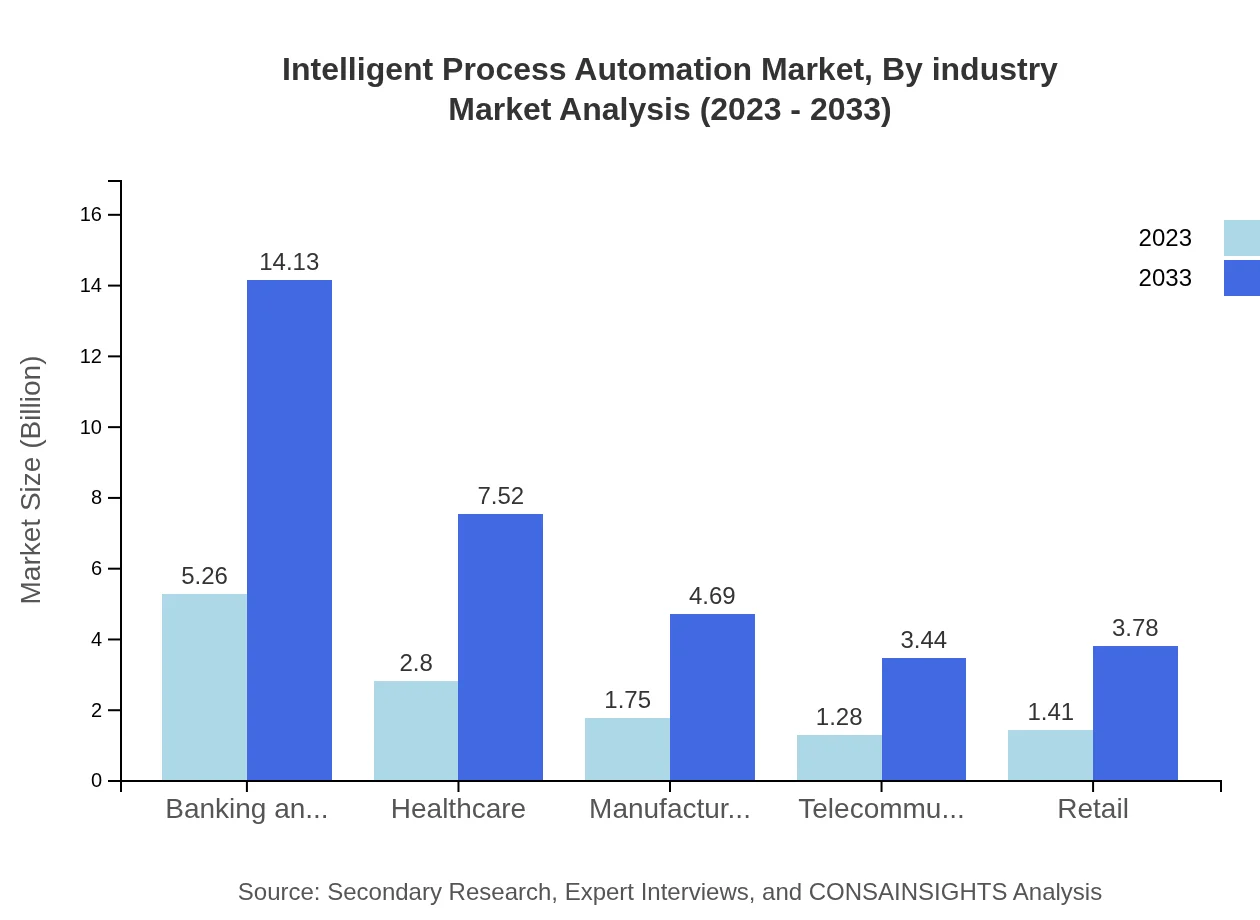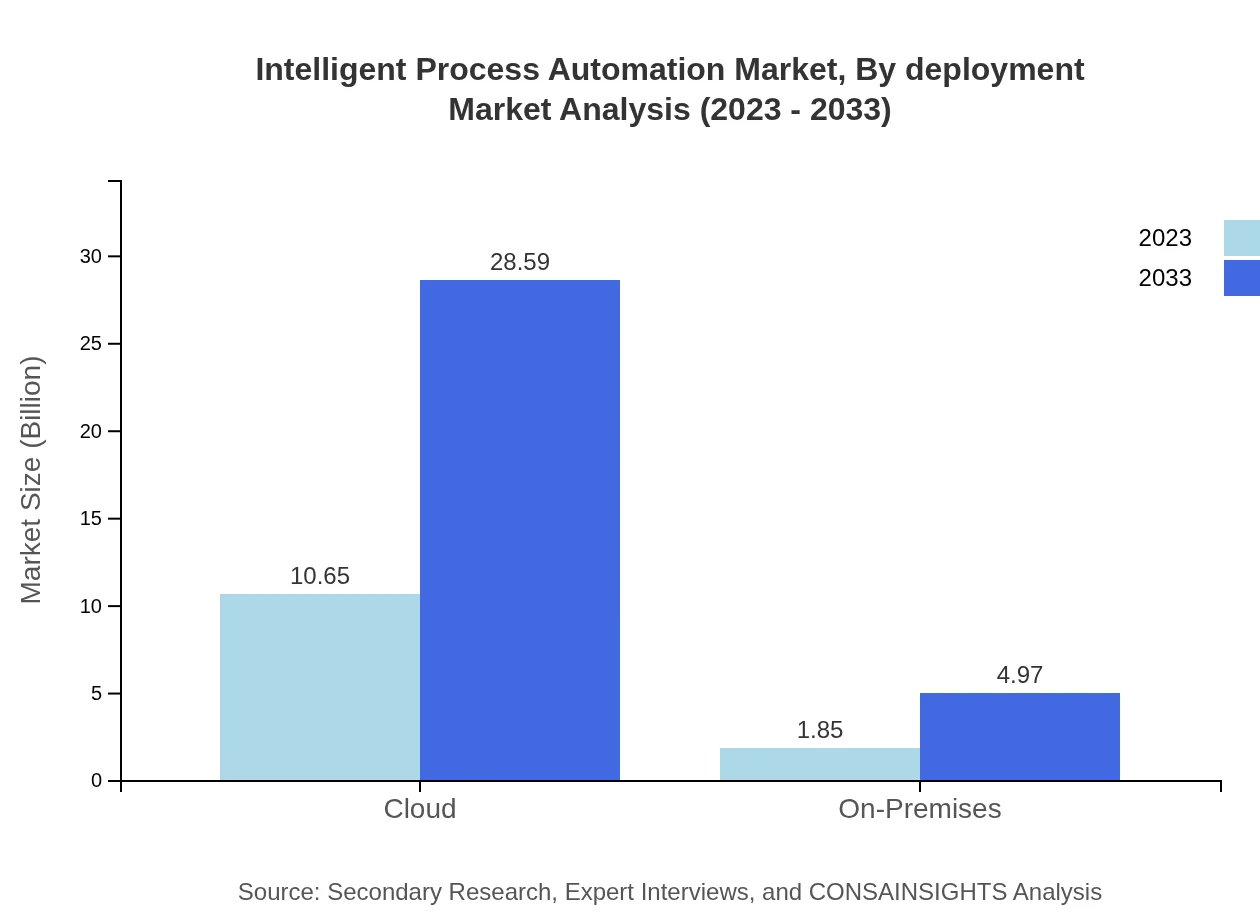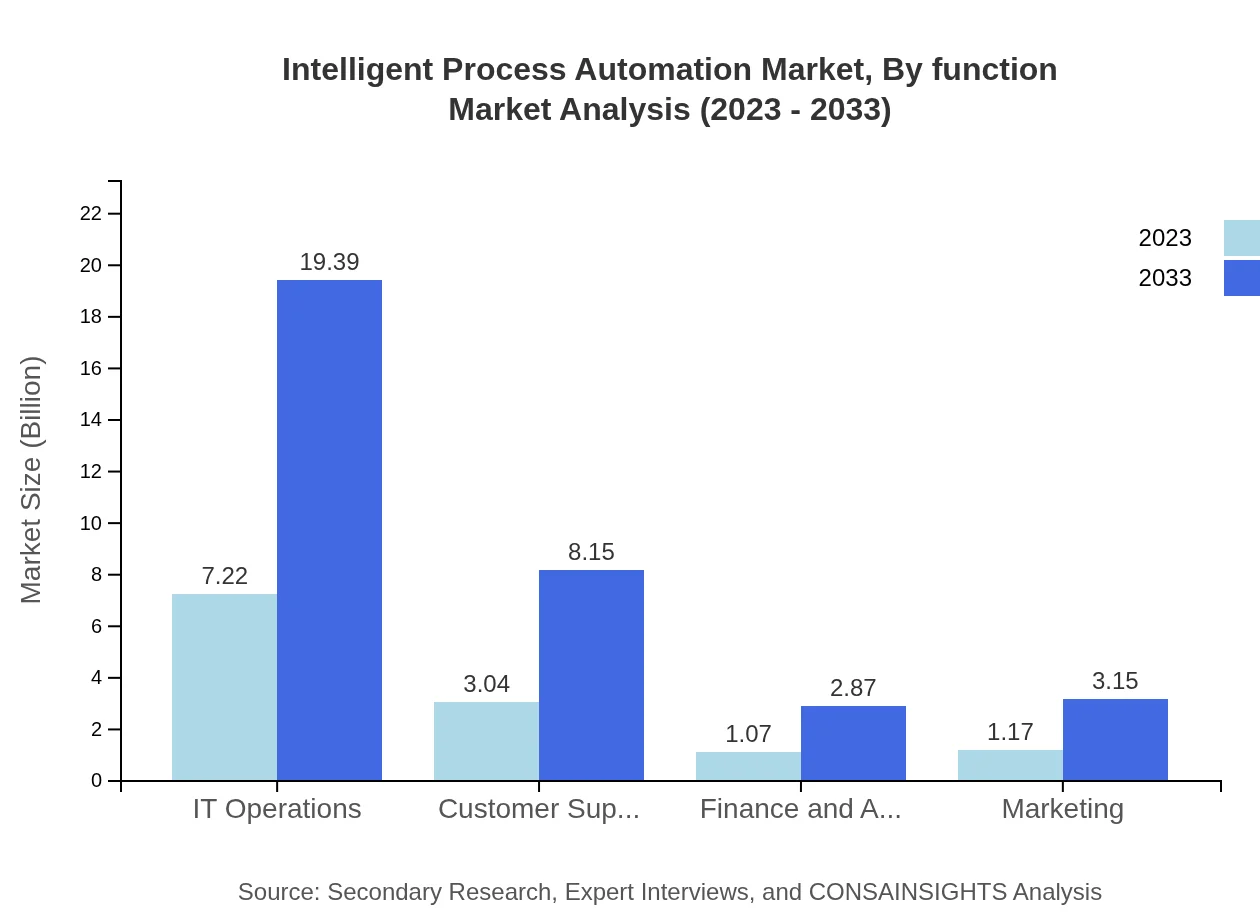Intelligent Process Automation Market Report
Published Date: 22 January 2026 | Report Code: intelligent-process-automation
Intelligent Process Automation Market Size, Share, Industry Trends and Forecast to 2033
This report provides an extensive analysis of the Intelligent Process Automation market, covering current and forecasted trends from 2023 to 2033, including market size, segmentation, regional insights, and industry leaders.
| Metric | Value |
|---|---|
| Study Period | 2023 - 2033 |
| 2023 Market Size | $12.50 Billion |
| CAGR (2023-2033) | 10% |
| 2033 Market Size | $33.56 Billion |
| Top Companies | UiPath, Automation Anywhere, Blue Prism, Pega Systems, Kofax |
| Last Modified Date | 22 January 2026 |
Intelligent Process Automation Market Overview
Customize Intelligent Process Automation Market Report market research report
- ✔ Get in-depth analysis of Intelligent Process Automation market size, growth, and forecasts.
- ✔ Understand Intelligent Process Automation's regional dynamics and industry-specific trends.
- ✔ Identify potential applications, end-user demand, and growth segments in Intelligent Process Automation
What is the Market Size & CAGR of Intelligent Process Automation market in 2023?
Intelligent Process Automation Industry Analysis
Intelligent Process Automation Market Segmentation and Scope
Tell us your focus area and get a customized research report.
Intelligent Process Automation Market Analysis Report by Region
Europe Intelligent Process Automation Market Report:
The European market for Intelligent Process Automation starts at $3.69 billion in 2023 and is expected to reach $9.91 billion by 2033. Countries like Germany and the UK are leading adopters, focusing on improving manufacturing processes and service efficiency through intelligent automation.Asia Pacific Intelligent Process Automation Market Report:
In 2023, the Asia Pacific Intelligent Process Automation market is valued at $2.53 billion and is projected to reach $6.78 billion by 2033, showing strong growth as businesses invest in automation to enhance competitiveness. Growing economies like India and China, alongside government initiatives for manufacturing automation, significantly contribute to this growth.North America Intelligent Process Automation Market Report:
In North America, the market is estimated at $4.24 billion in 2023, projected to grow to $11.39 billion by 2033. The region exhibits robust adoption of IPA technologies, primarily in financial services and healthcare sectors, driven by a push towards operational efficiency and enhanced customer experiences.South America Intelligent Process Automation Market Report:
The South American IPA market starts at $0.73 billion in 2023, with forecasts estimating it will grow to $1.95 billion by 2033. The rise of digital transformation efforts among key industries like finance and healthcare, particularly in Brazil and Argentina, are primary growth drivers.Middle East & Africa Intelligent Process Automation Market Report:
The Middle Eastern and African market begins at $1.31 billion in 2023 and is estimated to grow to $3.53 billion by 2033. The increasing digitalization efforts, particularly in the UAE and South African industries, boost the demand for IPA solutions across various sectors.Tell us your focus area and get a customized research report.
Intelligent Process Automation Market Analysis By Technology
The technology segment of the Intelligent Process Automation market reveals substantial market sizes and growth trajectories. RPA leads with a market size of $8.11 billion in 2023, growing to $21.78 billion by 2033. AI and ML also showcase strong growth, increasing from $3.46 billion to $9.29 billion in the same period. These segments indicate a shift towards more sophisticated automation solutions being preferred by organizations across various industries.
Intelligent Process Automation Market Analysis By Industry
Analyzing by industry segments, Banking and Financial Services hold a significant portion of the market, starting at $5.26 billion in 2023 and expected to rise to $14.13 billion by 2033. The healthcare industry's adoption of IPA grows from $2.80 billion to $7.52 billion, emphasizing business efficiency and customer interaction improvements. Other sectors, including manufacturing and telecommunications, also show robust growth.
Intelligent Process Automation Market Analysis By Deployment
Deployment strategies within the IPA market show a clear preference toward cloud-based solutions, which command a significant share of $10.65 billion in 2023, projected to expand to $28.59 billion by 2033. On-premises solutions, while valuable, maintain a smaller footprint, growing from $1.85 billion to $4.97 billion, reflecting the ongoing transition towards cloud technologies.
Intelligent Process Automation Market Analysis By Function
The functional analysis of the IPA market shows clear implications for organizational workflows. IT Operations lead with $7.22 billion in 2023, growing to $19.39 billion by 2033. Customer support and marketing come next, indicating strong adoption of IPA tools to enhance service and communication. Advertisements across sectors reflect a growing trend to optimize core functions through intelligent automation.
Intelligent Process Automation Market Trends and Future Forecast
Tell us your focus area and get a customized research report.
Global Market Leaders and Top Companies in Intelligent Process Automation Industry
UiPath:
UiPath is a leading provider of RPA software solutions that enhance automation capabilities for organizations across various sectors. Their platform integrates AI tools and features aimed at improving business process efficiency.Automation Anywhere:
Automation Anywhere offers a comprehensive platform for RPA and intelligent automation. The company focuses on providing cloud-native solutions to facilitate digital transformation and optimize enterprise operations.Blue Prism:
Blue Prism specializes in RPA and provides an intelligent digital workforce solution. Their emphasis on security and reliability has positioned them as a trusted vendor for organizations looking to implement IPA.Pega Systems:
Pega Systems provides solutions for business process management and RPA. Their low-code platform allows enterprises to automate complex workflows while maintaining customer engagement.Kofax:
Kofax integrates smart automation technologies with enterprise information management. Their solutions enable organizations to enhance productivity through intelligent document processing and RPA.We're grateful to work with incredible clients.









FAQs
What is the market size of intelligent Process Automation?
The global intelligent process automation market is projected to reach a size of $12.5 billion by 2033, growing at a CAGR of 10%. This robust growth indicates increasing adoption and integration of automation technologies across various sectors.
What are the key market players or companies in this intelligent Process Automation industry?
Key players in the intelligent process automation industry include UiPath, Automation Anywhere, Blue Prism, and IBM. These companies lead the market with innovative solutions integrating AI, RPA, and business process management to enhance operational efficiency.
What are the primary factors driving the growth in the intelligent Process Automation industry?
The growth in the intelligent process automation industry is driven by factors such as the need for operational efficiency, cost reduction, and enhanced productivity. Furthermore, rising demand for business agility and digital transformation across sectors fuels the adoption of automation technologies.
Which region is the fastest Growing in the intelligent Process Automation?
North America is currently the fastest-growing region in the intelligent process automation market, with its market size projected to increase from $4.24 billion in 2023 to $11.39 billion by 2033. This growth reflects strong technology adoption and investment in smart automation solutions.
Does ConsaInsights provide customized market report data for the intelligent Process Automation industry?
Yes, ConsaInsights offers customized market report data tailored to the intelligent process automation industry. This includes specific insights, forecasts, and analyses suited to clients' unique business needs and strategic planning.
What deliverables can I expect from this intelligent Process Automation market research project?
Expect comprehensive deliverables from the intelligent process automation market research project, including detailed market analysis, growth forecasts, competitive landscape reports, and strategic insights to aid in informed decision-making.
What are the market trends of intelligent Process Automation?
Current market trends in intelligent process automation include the integration of AI with robotic process automation (RPA), a shift towards cloud-based solutions, and increasing focus on enhancing customer experiences and operational efficiencies in industries such as finance and healthcare.

